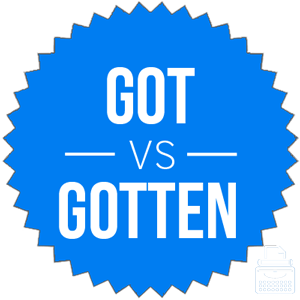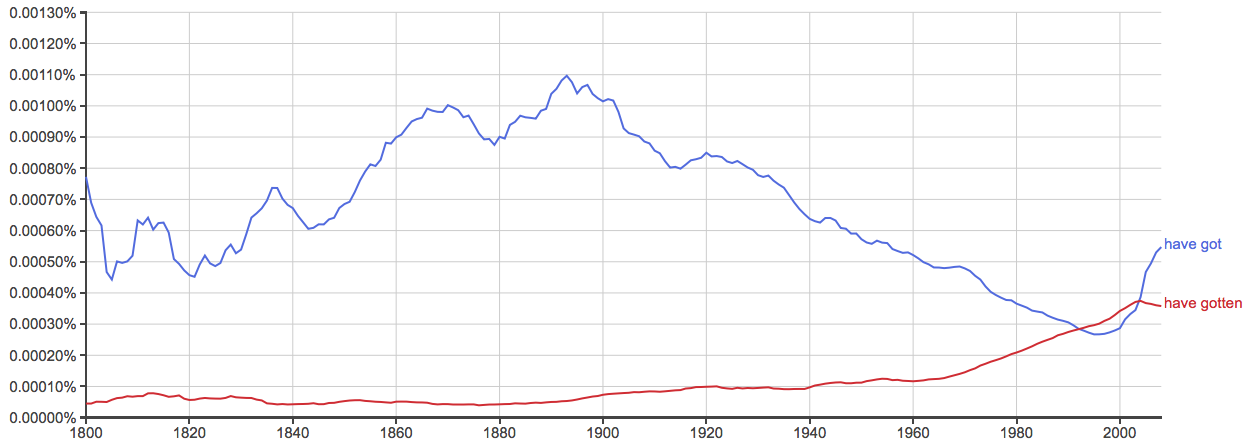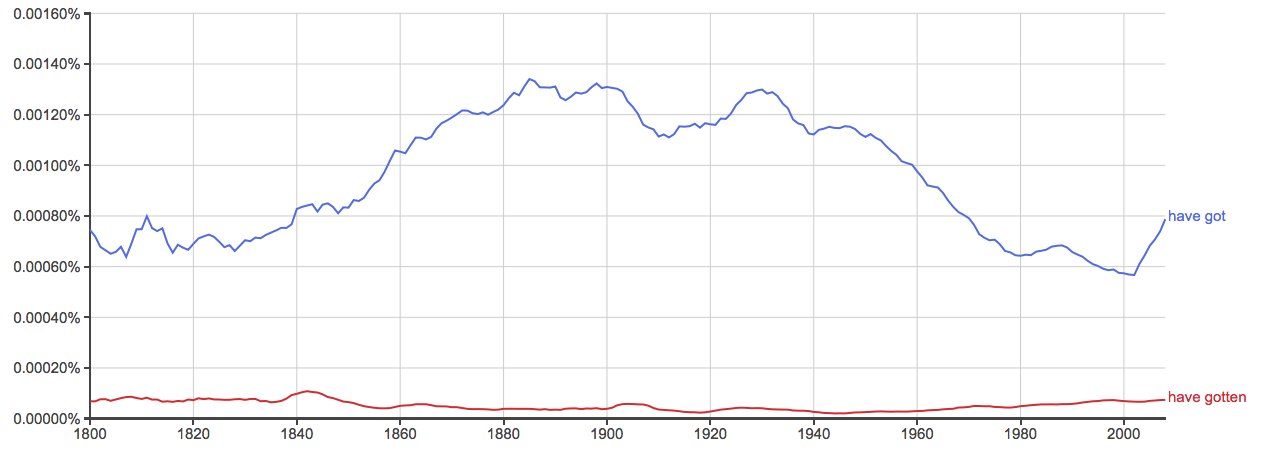Is It “Got” or “Gotten”?
powered by
LanguageTool
Is it “got” or “gotten”? While one standard favors “got”, the other prefers “gotten.” We’ll teach you the difference between “got” and “gotten.”
- In the United States and Canada, gotten is the preferred past participle form of the verb get.
- Got exists in all varieties as the simple past form.
- However, outside of North America, got is the preferred past participle of get.
Get is an extremely common verb. At one point or another, you’ve probably found yourself having to use the past participle form of this word and have asked yourself, “is it got or gotten?” This post will go over if gotten is a word, and whether you should use got or gotten.
Get, Got, Gotten—The Basics
Understanding when to use got or gotten requires going over the basics.
Get is a verb that has numerous meanings. A few of the definitions are:
1. “to gain possession of”
Nicole will get a new laptop next month.
2. “to succeed in attaining, achieving, or experiencing”
I need to get that new video game by any means necessary.
3. “to become affected by”
Kevin will get sick too if he doesn’t stay away from his sister.
Regardless of how get is used, the simple past tense is always got.
Nicole got a new laptop last month.
I got that new video game.
Kevin got sick because he didn’t stay away from his sister.
Additionally, the past participle of a verb refers to an action that was completed in the past. For example, the simple past tense and past participle of dance is danced.
I want to dance.
Yesterday I danced.
I had danced a lot when I was younger.
Regular verbs have the suffix —ed for both forms, but only irregular verbs have three different realizations.
So, what’s the past participle of get? Got or gotten? That depends on the context and the audience.
Gotten is often viewed as the newer and “American” way of conjugating get, but this word is quite old, predating its use in North America by several centuries. While those who spoke British English stuck with the get-got-got conjugation, North Americans favored get-got-gotten.
In the United States and Canada, using got or gotten as the past participle of get depends on the context.
Gotten is used when referring to the process of acquiring something.
Stephanie had gotten a fine for speeding in a residential area.
Got, on the other hand, is used when referring to a state of possessing or owning something.
I’ve got more brochures in the car if you need them.
When To Use “Got”
Outside of North America, where other dialects of English are used, got is the preferred form of the past participle of get.
So, the first example sentences above would be rewritten as:
Stephanie had got a fine for speeding in a residential area.
The second example sentence would remain as is.
Got vs. Gotten
So, when it comes to the past participle of get, the question is: Who is your audience, and what’s the context? Remember, in North America, gotten is used when referring to the process of acquiring something, while got is used when referring to owning or possessing something. Outside of North America, got is the most frequently used option.
One way to remain certain that you’re using the correct form of the word get is by using LanguageTool as your writing assistant. If you have British English as your primary dialect, it will remind you that gotten isn’t used in the United Kingdom. Besides that, LanguageTool will correct other spelling and grammar errors, suggest stylistic improvements, and supports a variety of languages, including other English dialects like Australian English, New Zealand English, and South African English.
Unleash the Professional Writer in You With LanguageTool
Go well beyond grammar and spell checking. Impress with clear, precise, and stylistically flawless writing instead.
Get started for free
We Value Your Feedback
We’ve made a mistake, forgotten about an important detail, or haven’t managed to get the point across? Let’s help each other to perfect our writing.
From Sarah Woodbury’s website: Romance and Fantasy in Medieval Wales
On the use of the word ‘gotten’
Several UK readers have wondered about the use of the word ‘gotten’ in my medieval mysteries. Since the word is not in common usage in England right now, it seems odd to them to read it at all, and a glaring ‘Americanism’ in a book set in the medieval period. At first glance, this might appear to be yet another instance of ‘two countries separated by a common language,’ but as it turns out, the history of the word ‘gotten’ is a lot more interesting than that.
‘Gotten’ is, in fact, an ancient English word that was in use in England at the time America was colonized by the English. Over the centuries, the Americans kept on using it and the English did not.
Origin: 1150-1200(v.) Middle English geten < Old Norse geta to obtain, beget; cognate with Old English –gietan (> Middle English yeten), German-gessen, in vergessen to forget; (noun) Middle English: something gotten, offspring, derivative of the v.
The British author quotes from reference.dot.com, whose the page is now obsolete.
“British English discontinued the use of “have gotten” as a form of the past participle for “get” over 300 years ago. […]. It is now rarely used in the British version of the English language. American English continues to use “have gotten” to emphasis the action performed. In American English language “has got” implies possession. It is assumed that if “has got” is used that it is referencing what the person has in their possession. On the other hand, “has gotten” implies that the person acquired, received or obtained an item.”
In brief, gotten is a perfectly legitimate word with a long and glorious history.
Languages are prone to evolve. Evolution of language occurs for any number of reasons, including geographical isolation of a group of speakers, natural change over time, and the need for new words to describe concepts that didn’t exist in the past.
In some cases, two different communities decide they want to speak different versions of a shared language simply to differentiate themselves from each other. By some accounts, part of the drive behind forming American and British forms of English was this exact reason. Americans wanted a distinctly American form of English, while the British have been more than happy to reinforce these differences to highlight their own linguistic superiority.
Thus, American and British writers often conjugate the verb get differently.
What is the Difference Between Got and Gotten?
In this post, I will compare got vs. gotten. I will use each of these words in at least one example sentence, so you can see how they appear in context.
Plus, I will show you a memory tool that can help you choose either got or gotten correctly in your own writing.
When to Use Got

One might get coffee from a café, for instance. To get something could also mean to obtain understanding, as in the phrase I just don’t get math.
Conjugations of Got:
- I/we get: first person singular and plural present
- You get: second person singular and plural present
- He/she/it gets: third person singular present
- They get: third person plural present
- Getting: present participle
- Got: simple past
Got can also be the past participle of get.
For example,
- There has got to be a better way to solve this riddle.
- He’s finally gotten rid of his chicken pox!
When to Use Gotten
What does gotten mean? Gotten is another way to conjugate get as a past participle.
For example,
- I wouldn’t bring up Mark’s drugs use with Sheila, she’s gotten very angry when we tried to talk to her about it in the past.
Americans are more likely to use gotten than are the British, who are more likely to use got in this tense. The charts below show the relative usage of gotten vs. got within each language community.
American English:
British English:
While these charts aren’t exhaustive in their literary scope, they only look at books published in English since 1800, they still paint a clear picture of a long-term usage trend.
American English: Got vs. Gotten
As the above charts show, American writers are more likely to use the word gotten than their British counterparts. But this graph doesn’t show the full story of this word’s use, as there is a usage difference in American English between got and gotten.
As the Oxford English Dictionary notes,
- Gotten usually implies the process of obtaining something.
- Got implies the state of possession or ownership.
Let’s look at a few examples to illustrate this.
- He has gotten two tickets to the Super Bowl.
- He hasn’t got any money to go to the concert.
The first example is about acquiring tickets to the Super Bowl. The second example is a description of someone’s ability to pay for something.
Trick to Remember the Difference
Got is your only option for a simple past tense form of get. As a past participle, however, there is a slight difference in American English usage.
- Gotten is used when talking about the acquisition of something.
- Got is used when talking the state of ownership of something.
Since gotten is spelled with an N, like the word acquisition, you can remember that that word is used when talking about how something has been acquired..
Summary
Is it gotten or got? The verb get is conjugated as a past participle as either got or gotten.
- American writers differentiate a use for gotten got.
- The British prefer got.
Contents
- 1 What is the Difference Between Got and Gotten?
- 2 When to Use Got
- 3 When to Use Gotten
- 4 American English: Got vs. Gotten
- 5 Trick to Remember the Difference
- 6 Summary
Both “got” and “gotten” are common terms in North America, but other English dialects do not use “gotten” at all. So why is this? And what is the exact difference between “got” and “gotten”? Check out our guide below to find out how to avoid errors when using these terms.
Present and Simple Past Tenses of “Get”
The present tense verb “get” has several meanings, including:
- Come to have or receive something (e.g., I hope we get a good reception)
- Attain, achieve, or obtain something (e.g., I get a newspaper every day)
- Reach a condition or state (e.g., He will get fat if he eats the whole cake)
The simple past tense of this verb is always “got,” regardless of the context:
We got a great reception from the crowd.
I got the newspaper this morning.
He got fat when he ate all the cake.
This applies in all English dialects. So, if you are using the simple present or past tense in your writing, the only terms you will need are “get” and “got.”
Past Participles: “Got” and “Gotten” in American English
We use past participles to form the present and past perfect tenses, which both show that an action has been completed. This verb form will follow “have,” “has,” or “had” in a sentence. And American English uses both “got” and “gotten” as past participles:
- We use “got” when referring to a state of owning or possessing something.
- We use “gotten” when referring to a process of “getting” something.
For example, if we were describing the process of “getting better” at something, we would use the past participle “gotten” in the perfect tenses:
She had gotten better in the last year.
Find this useful?
Subscribe to our newsletter and get writing tips from our editors straight to your inbox.
But if we were describing possessing enough time for something, we would use “got.” For example:
I have got enough time for a coffee before I go out.
The same usage applies in Canadian English. However, the term “gotten” is much rarer outside North America.
Past Participles in Other English Dialects
In other English dialects, the correct past participle form of “get” is always “got.” For instance, if we were to rewrite the examples above for a British audience, we would say:
She had got better in the last year.
I have got enough time for a cup of tea.
Notice that both sentences use “got” as a past participle. As such, if you’re writing for a non-American audience, you will not need the word “gotten.” In fact, the only time this term is used in dialects such as British and Australian English is in old-fashioned terms like “ill-gotten.”
Summary: Got or Gotten?
In American English, “got” and “gotten” can both be past participles of the verb “get.” The correct term depends on what you are describing:
- Use got when referring to a state of possessing something.
- Use gotten when referring to a process of “getting” something.
However, “gotten” is extremely rare outside North American (especially in formal writing). As such, you should always use “got” when you’re writing for a non-American audience. And if you want to be certain your writing is the best it can be, don’t forget to have it proofread.
Last Update: Jan 03, 2023
This is a question our experts keep getting from time to time. Now, we have got the complete detailed explanation and answer for everyone, who is interested!
Asked by: Nikko Jones DVM
Score: 4.9/5
(46 votes)
Gotten is a past tense form of the verb to get. … The past tense form of get is got; the past participle of got is gotten. A past participle is a word that’s used with had, have or has. Therefore, it’s perfectly acceptable to use gotten if it’s being used with its companion word.
Which is correct got or gotten?
Get is the present tense form of the verb. Got is the past tense form as well as one of the two alternatives for the past participle. The other alternative for the past participle is gotten, which is generally preferred in the United States.
Is gotten grammatically correct?
Is “Gotten” Correct? People in the United States and Canada use gotten for the past participle of got in most cases. People in English-speaking countries outside of the United States and Canada usually use got.
Is gotten actually a word?
One noteworthy word is gotten: standard in the US but not in the UK. In both countries, the past tense of get is got. In British English, the past participle is also got. But in American English, it’s more complex.
Is haven’t gotten proper English?
If you want to say about you not getting sleep or if you haven’t slept. Also remember that: gotten is the standard past participle for American English. While got is the past participle used commonly in British English.
25 related questions found
Is haven’t had grammatically correct?
«Have had» (and it’s negative ‘haven’t had’) are used when the ‘having’ continued from some time in the past until now — the ‘time view-point’ is NOW. «I haven’t had my breakfast today.» — Between the beginning of today and NOW, I have not had a breakfast.
What is worse got or gotten worse?
They are very similar, «it got worse» is what you would use to talk more solidly about a past event. «it has gotten worse» can only be used to talk about something still on-going. «Yesterday the weather was bad and it got worse.» — the events are all contained to yesterday.
Is gotten a Scrabble word?
Yes, gotten is in the scrabble dictionary.
Is gotten an old English word?
‘Gotten’ is, in fact, an ancient English word that was in use in England at the time America was colonized by the English. Over the centuries, the Americans kept on using it and the English did not. Origin: 1150-1200(v.)
Could I have gotten grammar?
2 Answers. The «could get» form implies a current or even any time situation. Using your example, «I don’t see how it could get past you» implies that you don’t see that capability for the time and situation being discussed, but also now. The «could have gotten» form is more limited in its scope.
Is I ve gotten proper English?
«I’ve got it» is not the simple past, it is the present perfect. The verb «get» has two possible past participle forms: «got» and «gotten». The second form, «gotten» is common in US English. The first form «got» is used in both the USA and Britain.
How do you use the word gotten?
And American English uses both “got” and “gotten” as past participles:
- We use “got” when referring to a state of owning or possessing something.
- We use “gotten” when referring to a process of “getting” something.
When was gotten first used?
“Just seeing the word is enough to set the hair of some British English speakers on end. Yet, despite the many claims that it is an Americanism, it is most definitely of British origin and the Oxford English Dictionary traces its first use to the 4th century.
Has or had meaning?
‘Has‘ is the third person singular present tense of ‘have’ while ‘had’ is the third person singular past tense and past participle of ‘have. … Both are transitive verbs, but ‘has’ is used in sentences that talk about the present while ‘had’ is used in sentences that talk about the past.
Have got or have gotten grammar?
5 Answers. In general, «have got» is the present perfect form of «to get» in UK English, while «have gotten» is the US English version. However, even in US English, «have got» is used in certain instances, namely to mean present tense have (in the sense of possession, or to mean must):
Can be got or gotten?
Trick to Remember the Difference
Got is your only option for a simple past tense form of get. As a past participle, however, there is a slight difference in American English usage. Gotten is used when talking about the acquisition of something. Got is used when talking the state of ownership of something.
Is gotten American or English?
2. got and gotten. In British English, the past participle of the verb get is got. In American English, people say gotten.
Is gotten a word in Australia?
The word get is a present tense verb, generally meaning to obtain, gain or acquire. The past tense is get, though the form gotten is gaining some currency in Australia. … Grammatically speaking, gotten is the past participle, though got can be used as the past participle as well.
Has gotten to me meaning?
(spoken) used to say that somebody has suddenly started to behave in a strange or different way: What’s got into Alex? He never used to worry like that. See also: Link to this page: <a href=»https://idioms.thefreedictionary.com/what+has+gotten+into+me»>What's got(ten) into (someone)?</a>
Should of or should have gotten?
The phrase should have indicates a missed obligation or opportunity in the past. In informal speech, it is contracted to should’ve, not «should of.» You should have (should’ve) called me!
Is it haven’t have or haven’t had?
The phrase would be «haven’t have had». Below is a sample of its use I found on the internet. Television is an important product of the Electronic industry YET increasingly difficult to sell ( We haven’t have had any ‘easy’ sales on television yet).
Did not had is correct?
3 Answers. «I didn’t have breakfast» is correct. After the auxiliary verb DO, we use the bare infinitive of the full verb, not a tensed form. «I didn’t had breakfast» is wrong.
Has or had had?
You have to use «had had» if something has been done long back, not recently. But if something has been done recently, then you can use «have had» or «has had» depending on the pronoun. For example, I have had a good lunch this afternoon.





